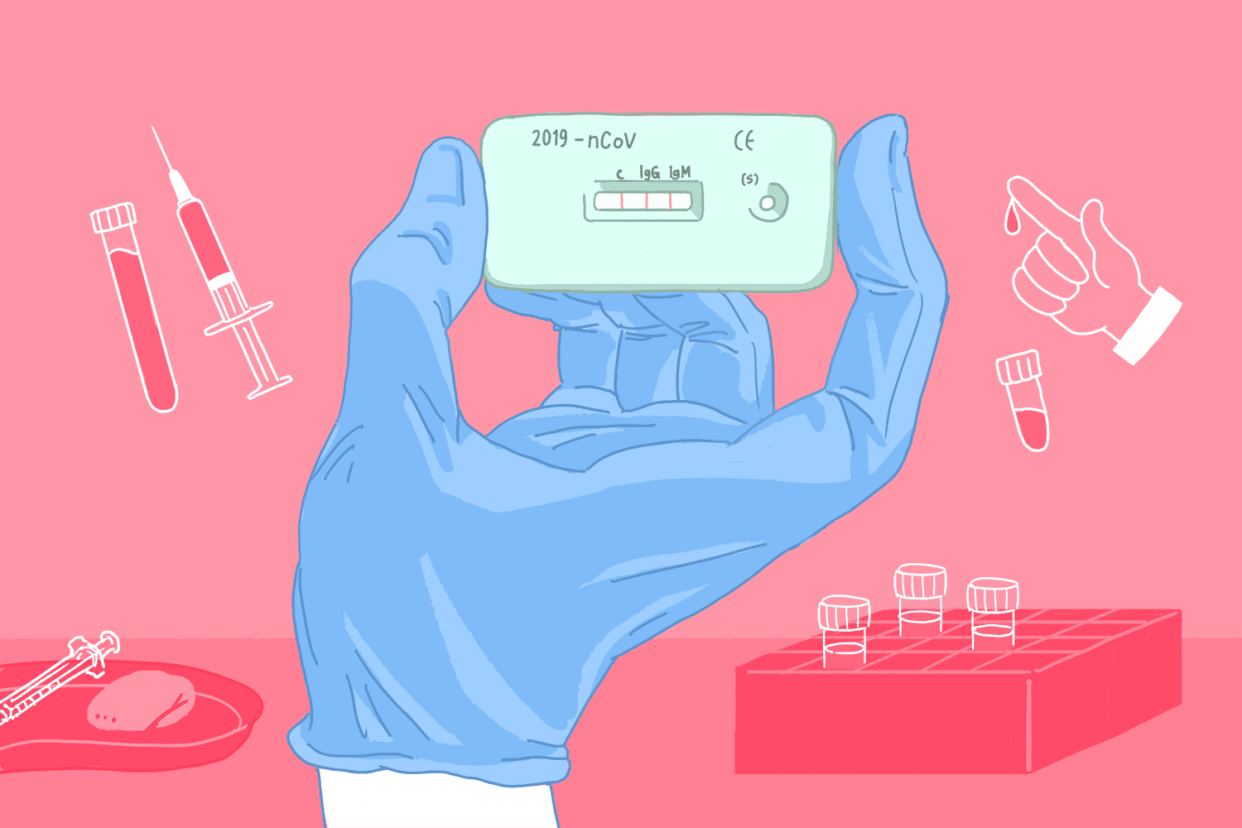What Can Antibody Tests Really Tell You?

Verywell / Joshua Seong
- Oops!Something went wrong.Please try again later.
Commercial antibody tests are being sold by biotech companies to detect antibodies to viruses like SARS-CoV-2 and the bacteria that causes Lyme disease
While antibodies are an important part of our immune systems, they don’t reveal the full picture of our health
Experts say it’s important to understand family health history, personal risk factors and lifestyle choices when it comes to overall well-being and disease risk
Have you ever wondered if you had COVID in the early days of the pandemic, long before you could secure a test to confirm your case? Or are you curious about whether your ongoing fatigue is actually a symptom of something more serious, like Lyme disease?
Aiming to help patients better understand their health, biotech companies are developing commercial testing services that check for antibodies from a host of infections and conditions including herpes, COVID, Epstein-Barr, and Lyme disease. And they often begin with an at-home blood test that you can then mail back for analysis.
Take a new testing service by Serimmune, for example. It works by using a blood sample patients collect at home. Researchers analyze the sample in a lab to identify antigens and epitopes associated with various diseases. The goal, Serimmune says on its website, is to profile patients’ immune response and find potential disease associations.
While fancy testing services exist, knowing your antibody levels to a particular virus isn’t a perfect indicator of your health or a confirmation that you have a disease. Experts say that antibodies, while important, only are part of the picture when it comes to your immune system.
“There are lots of components to the immune system,” Mehul Suthar, PhD, an associate professor at the Emory Vaccine Center at Atlanta-based Emory University, told Verywell. “Each work hand-in-hand.”
Instead, people should consider their entire immune system, understand their family health history, and practice lifestyle behaviors that boost immune function.
What Antibody Tests Can Tell Us
Antibodies—proteins made by your immune system designed to fight off invaders like viruses and bacteria—can come from natural infection or vaccination.
That means antibody tests can reveal if antibodies to a specific pathogen, like SARS-CoV-2, are found in your blood, either because you had a previous infection or were vaccinated against it. A lot of the times, tests do not distinguish if those antibodies are from a current or past infection, Diana Goode, PhD, an assistant professor at the University of New England in Maine who specializes in neuro-immune cell communication, told Verywell.
It’s important to know that some vaccines produce long-lasting antibodies that can offer protection for years or a lifetime—like the MMR vaccine.
The mRNA COVID vaccines, on the other hand, have a shorter antibody lifespan; antibodies caused by a vaccination may drop in half months after vaccination, Suthar said.
If an antibody test finds low levels of antibodies, this could be a sign that you don’t have enough protection against a disease and might need a vaccination. But, importantly, antibody serology tests should not be used to diagnose diseases. You should contact a healthcare provider for further testing.
Related:Is There a Way to Know If You’ve Never Had COVID?
Antibodies Are Just One Part of the Immune System
Goode said that because antibodies can decline over time, you shouldn’t be automatically alarmed if you have a “lower” antibody level than someone else.
This is because when you are infected with a virus like SARS-CoV-2, your immune system makes antibodies to combat it. Months after you’ve recovered, your antibody level might drop—but that doesn’t mean you have zero protection. Your immune response is more than just antibodies.
Say you had COVID in the past, and you contract it again. Your immune system’s memory B-cells will kick into high gear and create more antibodies to fight it. Then, there’s T-cells, which destroy the cells that have been infected, helping your body get rid of the virus. Both T-cells and B-cells are important parts of our adaptive immune systems.
Related:Urine Tests May Be the Future of COVID Antibody Testing
Goode said it’s also important to remember that no two immune systems are 100% the same, so some people might get more sick from a virus than others, simply based on factors like age, obesity, or other underlying health conditions. In other words, comparing your antibody levels to someone else’s isn’t comparing apples to apples.
How to Stay Health If Your Antibody Levels Are Low
When it comes to COVID-19, Suthar says that staying up-to-date with booster shots can help. If you have low antibodies for SARS-CoV-2 and you’re due for a booster dose, it might be time to roll up your sleeves to increase protection.
Suthar added that practicing behaviors that reduce virus risk is another way to protect against infection. This includes wearing masks in crowded or high-risk places, like concerts.
Goode said that while antibody levels can give you information about your health, what’s important for people to keep in mind is living a lifestyle that boosts overall well-being can reduce disease risk. This includes getting enough sleep on a regular basis, eating a balanced diet, exercising regularly, and avoiding things like smoking and drinking too much alcohol.
“Family history is also really important,” Goode said. This means if you have a family history of disease such as colon cancer, be sure to go for regular and possibly early screenings to monitor your health. Knowing what diseases you are at higher risk of can help you spot early warning signs—things that might not show up on an antibody test.
Biotech companies are working on commercial antibody testing services that tell you your antibody levels for things like COVID, but experts say antibody testing is only one part of the picture when it comes to your immune system.

